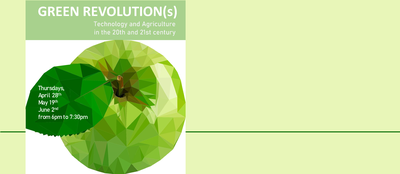

Die Agrarian Studies Group am Institut für Wirtschafts- und Sozialgeschichte der Uni Wien lädt in Kooperation mit dem IGLR zur Diskussionsrunde über „Green Revolution(s)“ ein.
- https://www.ruralhistory.at/de/veranstaltungen/sonstige-veranstaltungen/agrarian-studies-group-sommersemester-2022-1
- Agrarian Studies Group Sommersemester 2022/1
- 2022-04-28T18:00:00+02:00
- 2022-04-28T19:30:00+02:00
- Die Agrarian Studies Group am Institut für Wirtschafts- und Sozialgeschichte der Uni Wien lädt in Kooperation mit dem IGLR zur Diskussionsrunde über „Green Revolution(s)“ ein.
-
Was
Termin -
Wann
28.04.2022 von 18:00 bis 19:30 (Europe/Vienna / UTC200) -
Wo
KORA am Institut für Wirtschafts- und Sozialgeschichte, Hauptgebäude Universität Wien -
Name des Kontakts
Agrarian Studies Group -
Termin zum Kalender hinzufügen
iCal
"The Green Revolution(s). Technology and Agriculture in the 20th and 21st Century"
Recently, numerous governments, scholars and aid agencies have called for a 'New Green Revolution'. Biotechnology, they hope, can combat climate change and hunger. Not only could biotechnology further increase harvest yields, but might help to continue agricultural production in harsh ecological conditions – conditions which otherwise become increasingly difficult for agricultural production due to the climate crisis. Some advocates of this 'New Green Revolution' explicitly refer to the apparent success of the Green Revolution in the 1960s. The Nobel prize-winning molecular biologist Philipp A. Sharp, for example, argues that "history has shown that science can solve the nation's agriculture and food production systems". (New York Times, 04.01.2016)
In the coming round of discussions, we will first and foremost take a critical look at the first Green Revolution, aiming to assess both its benefits and pitfalls. At least in the short run the first Green Revolution certainly helped to alleviate the problem of food scarcity in the Global South. However, in the long run it caused new problems, such as declining soil fertility, the emptying of groundwater or dependencies on external agents such as seed corporations. Gaining insights into the long-term effects of the first Green Revolution might help us to understand possible implications of a New Green Revolution.
Im ersten von drei Treffen diskutieren wir:
1) Robert E. Evenson and Douglas Gollin, “Assessing the Impact of the Green Revolution, 1960 to 2000,” Science 300, no. 5620 (2003): pp. 758–762.
2) Pratyusha Basu and Bruce A. Scholten, “Technological and Social Dimensions of the Green Revolution: Connecting Pasts and Futures,” International Journal of Agricultural Sustainability 10, no. 2 (2012): pp. 109–116.
3) Keith Griffin, The Political Economy of Agrarian Change. An Essay on the Green Revolution. London and Basingstoke: The MacMillan Press (1974): pp. 1–14.
Die nächsten Termine sind am: Do, 19.5. und 2.6.2022
Für weitere Informationen: agrarian.studies.wiso@univie.ac.at
Website: https://agrarianstudies.univie.ac.at